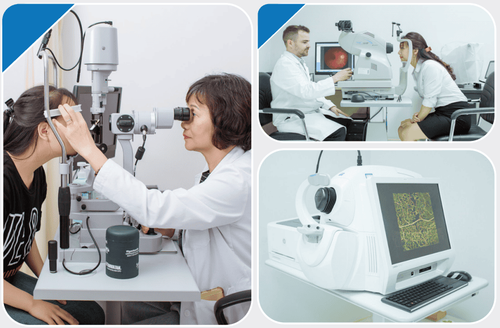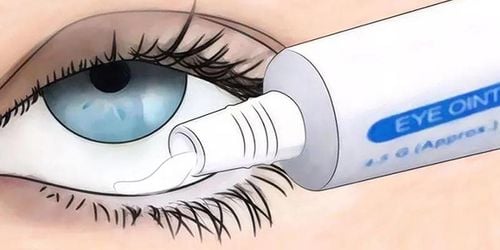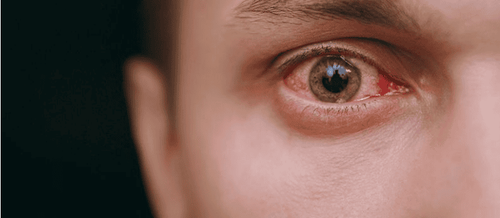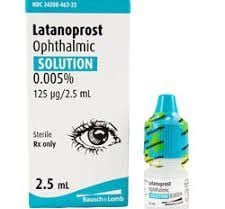This is an automatically translated article.
The article was professionally consulted by CKI Doctor Nguyen Thi Bich Nhi - Department of Medical Examination & Internal Medicine - Vinmec Nha Trang International General HospitalCataracts, also known as cataracts, are the second leading cause of blindness after cataracts. Early detection, proper treatment, and avoidance of complications that cause blindness are extremely important.
1. What is Glaucoma?
Glaucoma, also known as glaucoma or glaucoma, is an eye disease that is caused by an increase in the pressure of the aqueous humor in the eye to the extent that it damages the optic nerve (glaucoma). The disease is quite common, can occur at any age, the disease has no symptoms in the early stages so it is difficult to recognize. If not detected and treated early, the disease can lead to blindness.2. Causes of Glaucoma
Glaucoma has no clear cause, but is associated with increased pressure in the eye or decreased blood flow to the optic nerve. Elevated hydrostatic pressure can lead to glaucoma, but not everyone gets glaucoma when it comes to hydrocele. Some other factors that can increase the risk of Glaucoma include:Age: People over 60 years (Over 75 years: About 1 person has Glaucoma in about 10 people) Due to ethnic group: Yes People of African, Caribbean, or Asian ancestry have a higher risk of developing Glaucoma than people elsewhere. Genetics Have a history of eye injury Severe myopia High blood pressure Heavy smoking Decreased corneal thickness.

Hút thuốc có thể là nguyên nhân gây bệnh cườm nước
3. Classification of glaucoma
Glaucoma is divided into 4 types:3.1 Primary Open Angle Glaucoma
This type of glaucoma accounts for the majority of glaucoma incidence in most countries, mainly occurs in the elderly but can also occur in the elderly. occurs in middle-aged people. Family members of people with glaucoma have a higher risk of developing the disease than the general population, because the disease is often linked to genetic factors
Glaucoma progresses slowly and often goes unrecognized over many months. or many years. Many people do not know their vision is getting worse because central and near vision are still good, while night vision and peripheral vision are gradually decreasing
This condition usually responds well to treatment Glaucoma, but in some cases surgery is needed to drain the blockage in the aqueous humor ducts.
3.2 Acute angle-closure Glaucoma
This is the most common type of glaucoma in Vietnam, often occurs in middle-aged and elderly people, especially women due to the sudden and rapid increase in pressure in the eye . If not treated right away, in a short time it can lead to permanent eye damage and blindness.
Acute glaucoma often has obvious symptoms such as severe eye pain, blurred vision, red eyes, halos around light sources and accompanied by nausea.
3.3 Congenital Glaucoma
This type of glaucoma is rare and occurs in infancy. A child's eyes that are wide, watery, and unusually sensitive to light are symptoms that warrant an appointment with an ophthalmologist.
3.4 Secondary Glaucoma
Secondary Glaucoma will be caused by other conditions such as inflammation of the eye, tumor in the eye, eye surgery, eye trauma or cataracts in severe stages.
4 Symptoms of Glaucoma

Trong giai đoạn đầu, bệnh cườm nước không có triệu chứng, không gây đau, tầm nhìn vẫn bình thường
Severe pain in the eyes or forehead There have been cases of redness in the eyes Decreased or blurred vision has also been reported Some patients have increased intraocular pressure seeing rainbows or halos around bright lights Sensation of tightness, pupils dilated (pupils dilated) Patient may also experience abdominal pain, nausea and vomiting Sensitivity to light, sensation pain or fear of light. Early detection of the disease is extremely important. In order to detect glaucoma early, when the eye has symptoms as mentioned above, the patient should not self-medicate, but must go to a specialized medical facility to be appointed by a doctor to perform appropriate tests. , cure.
5. How to treat glaucoma?

Cách điều trị bệnh cườm mước sẽ phụ thuộc vào loại glaucoma, mà từ đó bác sĩ có thể chỉ định sử dụng thuốc điều trị Glaucoma (thuốc nhỏ hoặc thuốc uống)
Treatment will depend on the type of glaucoma, from which the doctor may prescribe Glaucoma medication (drops or oral medication), surgery or laser treatment.
Use Glaucoma Medications: Medicines, in the form of eye drops or pills, are intended to reduce pressure on the eye by helping fluid drain from the eye. Medicines used in treatment should be guided under the prescription of an eye specialist to avoid side effects. Surgery is only performed when drug treatment is ineffective and is usually only applied in acute cases: Laser surgery: Depends on the severity of the pain and aims to reduce pressure in the eye Conventional surgery: When drug therapy or laser surgery fails, conventional surgery is necessary to intervene to reduce the damage caused by cataracts and restore vision. . Most cases of cataracts, when treated early, have a good chance of preventing vision loss and being highly effective. People with a diagnosis of glaucoma need to know that it is a lifelong disease, and complete adherence to prescription medication regimens and regular visits with an eye doctor is imperative.
Because the etiology of the disease is not clear, it is not possible to prevent glaucoma. However, cataract blindness can be prevented by early detection, appropriate treatment, and regular monitoring.
Glaucoma package at Vinmec International General Hospital currently includes comprehensive examinations and indications for surgery (if any) for customers with symptoms of Glaucoma (glaucoma).
Currently, Vinmec is implementing 2 packages of Glaucoma examination and treatment, including: Glaucoma early detection package and scleral trabeculectomy package to help:
Comprehensive eye examination and indication for surgery (if any) by Experienced specialist Doctor Advice on drugs, food, factors that may affect surgery Anesthesia examination and resuscitation assess the patient's general condition before surgery Explain surgical prognosis.
Please dial HOTLINE for more information or register for an appointment HERE. Download MyVinmec app to make appointments faster and to manage your bookings easily.













